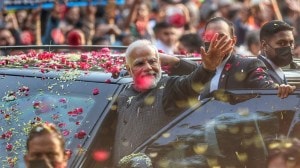‘We cannot be wished away just like that’
Rising from humble origins,Bimal Gurung has gone on to capture the imagination of the Gorkha community

Man of the moment
Rising from humble origins,Bimal Gurung has gone on to capture the imagination of the Gorkha community
THE man sells the dream of a separate Gorkhaland for in the hills—Bimal Gurung—comes from a humble background. Born to parents who were tea garden workers at Takvar valley, Gurung belongs to the Singmari area in the northern outskirts of Darjeeling town.
Having to support his family at an early age, Gurung had to make do with just primary education. He tried several odd jobs, from driving tourist jeeps to working as a contractor. In fact, his days as a driver gave him a solid following among transport operators who now form a large chunk of his support base.
Soon after the Gorkha National Liberation Front (GNLF) was launched in the early 1980s, Gurung joined it and soon became one of Subash Ghisingh’s most fierce fighters. Prior to the tripartite agreement between the GNLF, the West Bengal Government and the Central Government in 1988, Gurung heeded Ghising’s call for surrendering arms, giving up his two firearms and several grenades. As a result, he was absolved of about 43 criminal cases that included among others, arson, rioting and murders.
Gurung was often described as an “iron bar” on account of his immense strength but apparently Ghising never gave him the importance he deserved.
It soon became evident to Gurung that he would have to shape his own destiny and so he started concentrating on social work. Those who have followed his career say he became a “hero” in the Lebong-Takvar valley area because of his social commitment. If there was a wedding in the village, he would arrange funds, if someone fell ill, he would ensure they got medicines. He also arranged financial aid for the elderly in the area and looked after the welfare of tea garden workers.
In 1990, just two years after the DGHC accord was signed, Gurung formed the Parbatiya Bekari Sangathan (Hill Unemployed Association).
In 1996, Gurung contested as an independent—after Ghising denied him a nomination—and defeated the GNLF candidate. It was only then that Ghising inducted Gurung into his council, allotting him the Sports and Youth Welfare portfolio. But the chief’s brief to him was to largely manage the finances and look after logistics.
Having realised that Ghising would never really take him into confidence, Gurung began distancing himself from 2004 on. The gap between them further widened during the Indian Idol contest in July-August 2007 in which Prashant Tamang from Darjeeling hills was a leading contender.
Gurung scouted for support for Tamang from all quarters. Tamang won the reality show and Gurung established himself as an emerging leader from the hills with his pan-Gorkha mobilisation. In the final phase of the TV contest, Ghising was away in Malaysia and in his absence Gurung’s popularity grew.
Riding on a a massive goodwill, Gurung began eyeing support in the foothills too—the Terai, the Dooars and the neighbouring regions that had a good sprinkling of Nepali speakers. He finally severed his ties with the GNLF and formed his own outfit of Darjeeling Gorkha Janamukti Morcha on October 7, 2007.
His first mass movement was for the removal of Ghising as caretaker administrator the DGHC. He promised that Ghising, in the post since 2004 on six-monthly extensions given by the West Bengal Government, would be gone by March. When Ghising returned from Kolkata in February, he found his way to Darjeeling blocked by GJM activists. Gurung lifted the blockade only when Ghising resigned after a fortnight. That was March, as Gurung had promised. That is why today people believe Gurung will deliver on his assurance of Gorkhaland by 2010.
With both the state and the Centre having rejected your demand for a Gorkhaland state, how will you take the agitation forward?
Whether we will be given a separate state of Gorkhaland or not should be conveyed to us at the discussion table. We can’t be wished away just like that. Let the Centre and the state call us for talks and announce that we will not get a state. But how can one deprive us of the right to a discussion? We will continue with our democratic and Gandhian struggle as long as we do not get a respectable answer from the authorities.
The situation in the foothills has taken a communal turn and fingers are being pointed at you too.
The Gorkhas will not fight on the streets. We will not go for a communal war. These communal bodies have been propped up by the Bengal Government and by the West Bengal Minister of Municipal Affairs, Asok Bhattacharya, to malign us. We had never seen the Amra Bangali or Jana Chetna Manch earlier. And the Army was called out for something that could have been tackled by the police.
Will you be more careful henceforth in holding rallies and protest marches in Siliguri and Dooars?
Can’t we even talk about our demands, our wishes and our grievances? Will all the sacrifices by Gorkhas go waste after all these years? If pushed further, we will request Gorkha soldiers all over the world to surrender their arms and come back.
What will be your next step?
Our next step will be the dissolution of the Darjeeling Gorkha Hill Council through a constitutional amendment. If the state Government does not do it, we will be forced to close it forcibly. All employees will be withdrawn.
Photos


- 01
- 02
- 03
- 04
- 05





























